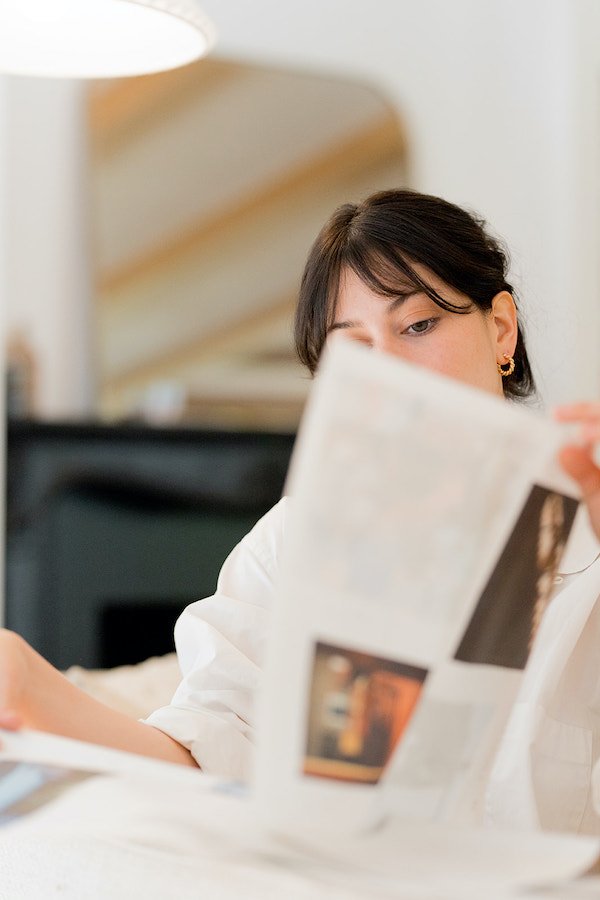
How I’m Managing Guilt Every Time I Throw Things Away
“Are you sure we actually need this?”
My husband asked while filling up boxes in our apartment, holding a pile of stacked plastic containers. There were several tubs from nights of takeout, which we now used for miscellaneous food storage and leftovers. In all, the collection of containers was far more than we would ever need for a week, even two.
“I don’t want to throw away plastic, and it doesn’t always get recycled,” I sighed. “Let me see if I can give them to our neighbors.” I posted a photo of the pile to our community’s private Facebook group, to which we immediately received multiple DMs of interest.
“Why waste what can be reused?”
When we decided to move cross-country in late 2020, I knew we’d have to pack lightly to compress our entire lives into an 8’ x 8’ PODS container; we’d have to be ruthless about what made the cut. But as soon as we began putting items into trash bags, the guilt settled in.
I’ve always struggled with throwing things away, partly because throughout my childhood, I grew up hearing about the shames of being wasteful. My immigrant family’s need to repurpose goods stemmed from circumstance; my parents couldn’t always afford Pyrex glass containers, Tupperware sets, or bulk sizes of Hefty garbage bags. So for plastic takeout containers and grocery bags, the directive was always the same: Why waste what can be reused?
As an adult, I saw the low-waste benefits of keeping reusable packaging or hanging on to older clothes-turned-rags, too. Just like my mother, if a shirt had ratty holes or stains, I turned it into a pajama top. Then, when it became too worn for sleep, I cut it into pieces to wipe down countertops. The only time apparel was thrown away was when it was truly too frayed, faded, and dysfunctional to use again.
Similarly, as a South Asian child, every meal came with the refrain, “There are hungry kids back in India.” I know my parents meant to instill a feeling of gratitude and to avoid waste whenever possible. But instead, it made me feel almost responsible for those without food. Did they mean my own cousins in India don’t have food? (No, fortunately.) There were many dinners over the years where I sat uncomfortably full for fear of being wasteful—not realizing my unfinished plates couldn’t be rewrapped and mailed to the motherland anyway.
“I felt ashamed every time I headed toward the garbage can.”
That mindset turned me into a near-hoarder in my adult years, as I feared throwing even one reusable thing away. My dreams of a clean, warm home became plagued with closets and countertops littered with items to save “for later.” Between both the first-generation immigrant and sustainability perspectives, I felt ashamed every time I headed toward the garbage can.
But the countless plastic containers were never actually used for meals; the many paper bags were never upcycled into gift wrap. The clutter stressed me out, and it also bothered my husband. But this stress didn’t compare to the shame of throwing things away—that was a shame I couldn’t shake.
You are lucky to have so much; you might as well hold on to it in case you don’t one day.
Or, equally as horrifying: If you throw that out, it’ll end up in a landfill forever.
It wasn’t until packing for our move that I realized this mindset was no longer sustainable—for myself, my mental health, or my home.
We often hear the environmental initiative to “reduce, reuse, recycle.” But perhaps the phrase “reframe, reduce, renew” was more what I needed to hear. Eventually, coming to terms with both my individual actions and systemic shortcomings—because the world’s pressing issues around hunger or waste (or, ahem, climate change) were systemic—helped me understand and reframe what I could be responsible for.
“Coming to terms with both my individual actions and systemic shortcomings helped me understand and reframe what I could be responsible for.”
Was it practical to avoid throwing out anything, ever? Not at all, and the toll on my emotional wellbeing wasn’t worth it either. But could I be mindful not to over-cook or over-purchase? Yes, absolutely. Because if we all scaled back in our own lives, we could ultimately avoid so much waste.
And, of course, it was much easier to avoid the guilt of throwing things away if I didn’t have to do it as much. That’s why I spent the last year or so focusing on what I really need in my new apartment and actively avoiding clutter—like skipping out on “paint-by-color” kits and one-time latch hook sets and instead doodling digitally on my iPad or going to a designated art class outside of my home.
Similarly, I’m building an iPhone album of photos I’ve enjoyed but no longer need to keep, like old birthday cards. My colleague Danielle’s guide to managing sentimental clutter has helped relieve guilt about discarding anything meaningful. The thoughtfulness is the same, even if not in 3D form.
Finally, when I do need to “throw something away,” I remember it doesn’t literally translate to throwing it away in the garbage. I can gift it to the community, transform it into something new, or continue to repurpose its intended use as I’ve always done.
“We can be intentional about having things we’ll need to eventually throw away.”
For old homewares we’ve now replaced and upgraded (think: a knife block, utensils, and slightly chipped but fully functional sets of plates), we reached out to local shelters for domestic abuse survivors to see if they could use our gently used items. We were able to gift on the goods that served that chapter of our lives and would now support their next ones.
Sometimes, the unfortunate reality is that things may be irreparably broken or no longer useful and that we do have to send items to landfills. But rather than be wracked with guilt every time it happens, we can be intentional about having things we’ll need to eventually throw away, consuming just what we need, and repurposing what we don’t.
Speaking of, to my Santa Barbara neighbors, does anyone have a need for a pile of old magazines? 😉
Henah Velez (she/her) is an Editor at The Good Trade. She holds a Master’s in Social Entrepreneurship and is a proud Rutgers grad. Originally from NJ, Henah’s now in Santa Barbara, CA, where she loves shopping small, hanging with her pets, or traveling. Say hi on Instagram!





